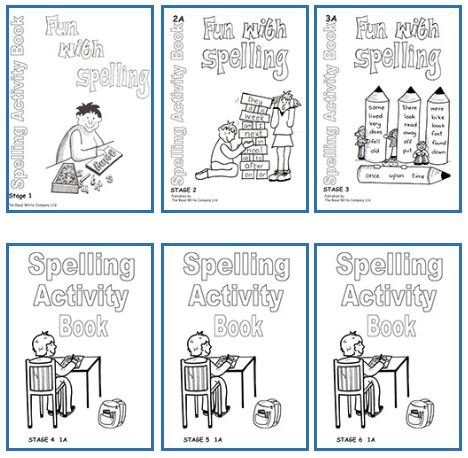The CSP Spelling and Language ProgrammeAn inclusive differentiated whole class approach in 6 stages for 5-11 year olds
The CSP Spelling and Language Programme is the new name for 'The Complete Spelling Programme' by McMurray and Fleming. The CSP Spelling and Language Programme is published by The Read Write Company Ltd and reviewed in Brooks's 'What Works for Literacy Difficulties. The effectiveness of intervention schemes' 6th edition.
To read the review click on the link below.
The CSP Spelling and Language Programme is a graded spelling course designed for use in the primary school.
Spellings are planned for each school year and structured into daily word groups.
Rhyme patterns and frequency words are presented three days per week and curriculum word banks are included in the programme. There are also weekly dictation sentences (Stages 2-4).
Learning is reinforced through activity books that are
differentiated for differing abilities.
In Stages 1 - 2 the rhyme patterns move very slowly to enable children with orthographic processing difficulties to develop awareness of orthographic patterns. Poor orthographic awareness is a cause of long-term spelling difficulties resulting in some children spelling words how they sound without the recognition that they have chosen the wrong letters e.g. "skool" for "school", "cote" for "coat", 'sed' for 'said '. It is important that teachers recognise the importance of developing orthographic knowledge for children at risk of long-term spelling difficulties.
From Stage 2 onwards it is important that teachers focus on developing morphemic knowledge (word meanings, suffixes, prefixes) for the rhyme patterns to extend the majority of the class.
High frequency words also provide differentiation. Adding curriculum words as instructed in the manual ensures that words that are taught will be required by children when writing independently.
The activities assist children in the unitisation of sounds, an essential strategy which reduces the burden on working memory.
Daily spellings are presented with differentiated follow-up activities designed to facilitate the integration of phonic, orthographic and morphemic strategies.
The programme can be used alongside a phoneme to grapheme strategy for reading.
The Read Write Company is the sole publisher and supplier of 'The Complete Spelling Programme' written by Sharon McMurray MBE and Christine Fleming and, in 2014, to avoid confusion with other publications with the same name 'The Complete Spelling Programme' written by Sharon McMurray MBE and Christine Fleming (1st edition, 1998) has been renamed 'The CSP Spelling and Language Programme' .
The programme is sold in PDF format. This is to allow teachers to use the programme on the interactive whiteboard. Schools buying this programme are also granted a licence to print out paper copies for use with children in their school. Using the programme, in part or in whole, in any other school or location is strictly prohibited.
Email: info@readwritecompany.com

